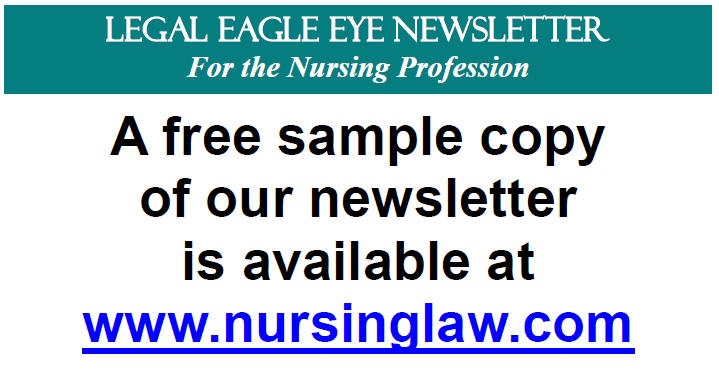
Narcotics Addiction And Diversion: Court Says More Likely Than Not Is Standard To Judge Nurse
Legal Eagle Eye Newsletter for the Nursing Profession
September 1999
Quick Summary: Proof "beyond a reasonable doubt" is not necessary for an employer to take action against an impaired nurse, by firing or reporting the nurse, or for the state nursing board to take action, by suspending or revoking the nurse’s license.
Granted, burglarizing a home-health client’s home, stealing narcotics and being in unauthorized possession of narcotics are criminal offenses.
The correct legal standard is a "preponderance of the evidence."
That simply means it is more likely than not that the unprofessional conduct charged to the nurse has actually occurred.
A nurse has a substantial vested interest in maintaining an active nursing license as the means of earning a livelihood.
However, the state board also has a substantial vested interest in regulating the nursing profession in order to safeguard the life, safety and health of the people.
SUPREME COURT OF VERMONT, 1999.Two home health clients complained to the agency that their nurse was stealing their Percocet tablets.
The nurse in question had been on a probationary license that required her to remain drug and alcohol-free, although that condition had been dropped and her license was fully restored before these new complaints were lodged against her.
There was more than one explanation for the clients’ complaints. One obvious possibility was that one or the other of the clients was addicted and overusing Percocet or diverting Percocet and concocting false charges against the nurse to cover up.
The nurse’s behavior was suspicious. She would make unscheduled visits to the clients’ homes, ostensibly to make phone calls, and then use the restroom before leaving. They kept their pills in their bathrooms. When one of them moved the pill bottle to the kitchen cabinet, the nurse would stop by and use the restroom, then wash her hands at the kitchen sink instead of in the bathroom.
Working with the supervising nurse and with the clients, a state investigator devised a plan. One of the clients left two Percocets out near the phone at a time when the home health nurse knew he would be at his doctor’s appointment. The nurse stopped by. The investigator went into the home before the client returned and found the pills missing. Testimony about this resulted in the nurse having her license suspended pending treatment.
The Supreme Court of Vermont ruled there was enough valid evidence for the employer and the state board to act against this nurse. It was more likely than not that the nurse was again addicted and was diverting narcotics from her clients. That did not have to be proven beyond a reasonable doubt, the court ruled. In re Smith, 730 A. 2d 605 (Vt., 1999).
More from nursinglaw.com
http://www.nursinglaw.com/narcotics-nurse-disability-discrimination.htm
http://www.nursinglaw.com/narcotics-diversion-defamation.htm
http://www.nursinglaw.com/narcotics-diversion-nurse.pdf
http://www.nursinglaw.com/narcotics-diversion-nurse-tampering.pdf
http://www.nursinglaw.com/diversion-narcotics-nurse-disqualified.htm
http://www.nursinglaw.com/narcodiversion.htm